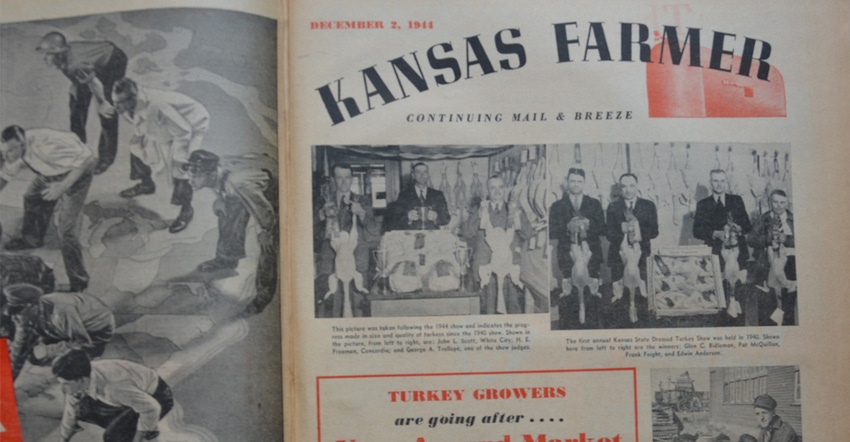November 4, 2019

Kansas turkey growers were gearing up to take advantage of new trends in turkey production, processing and marketing after organizing the Kansas Turkey Federation in December of 1944.
Extension specialists at Kansas State University said turkeys were already a $7 million-per-year crop for Kansas farmers and they believed that would increase with the ability to increase production to meet a year-round demand for turkey meat.
Turkeys emerged from the luxury classification of meat, largely as a result of meat rationing during World War II.
The demand was driven by hotels, restaurants and institutions that bought turkeys when they were plentiful and kept them frozen for later use.
Record prices for turkeys were expected as demand increased.
55 years ago
Veterinarians traced 589 outbreaks of hog cholera in fiscal 1964. According to a report in the Dec. 5, 1964 issue of Kansas Farmer, 36% of the outbreaks were caused by shipment of infected or exposed hogs; and 25% were due to area exposure such as trading equipment or hogs with neighbors or any other farm-to-farm traffic.
Improper use of vaccines causes 19% of cases, while 5% were attributed to the feeding of raw garbage to pigs. The remaining 15% came from a variety of causes.
35 years ago
There was big concern about weather and government action among Kansas beekeepers in December of 1984. The concern about weather centered on drought, which virtually wiped out honey production in much of Kansas during the dust bowl years. The concern about government was a proposal to end the honey loan program, which beekeepers contended would bankrupt most commercial honey producers.
20 years ago
In December of 1999, Kansas FFA member Michael Springer was named American Star Farmer at the national FFA Convention in Louisville, Ky. In a speech accepting his award, he expressed faith in the future.
“There’s always going to be a place for production agriculture because everyone has to eat,” he said. “Hard times are helping us be more efficient and making us better business people.”
Goerzen is executive director of Old Cowtown Museum in Wichita.
About the Author(s)
You May Also Like




